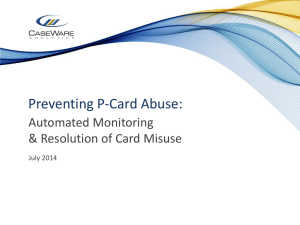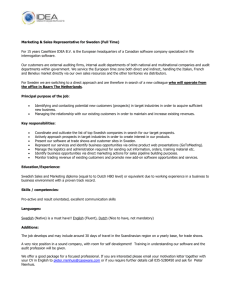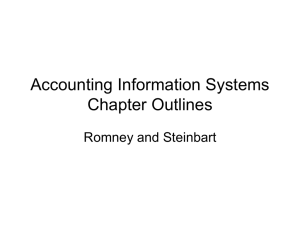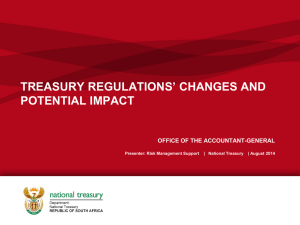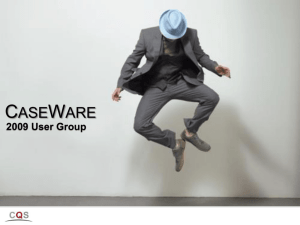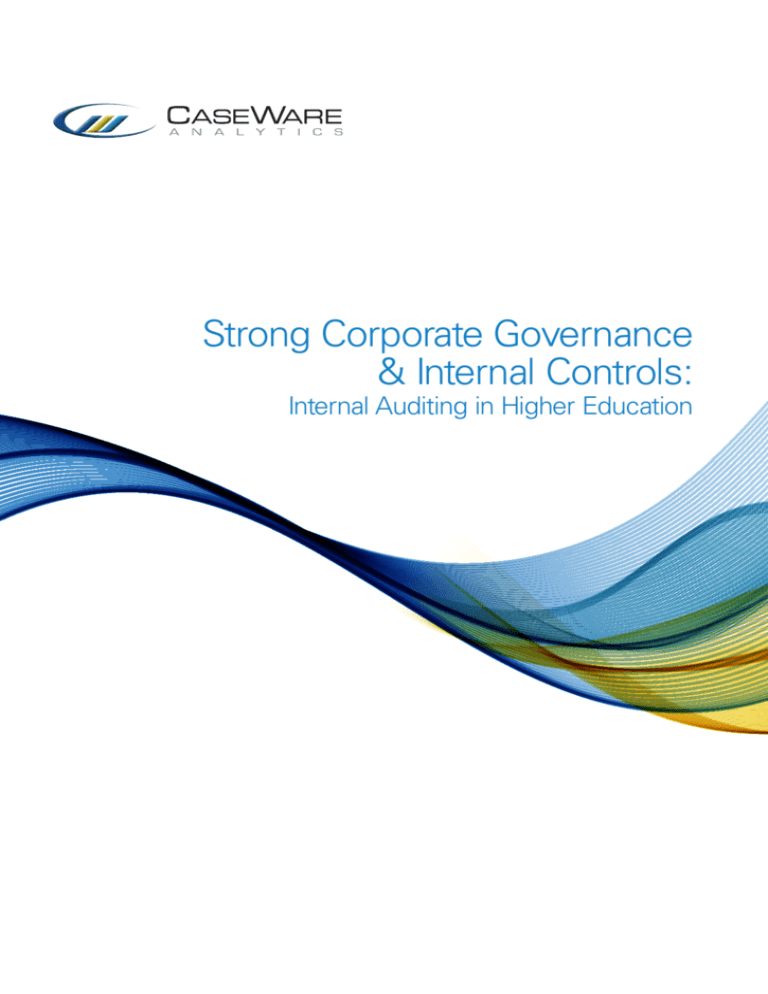
Strong Corporate Governance
& Internal Controls:
Internal Auditing in Higher Education
Contents
Introduction
Internal Audit as Trusted
Advisor & Business Partner
Big Ticket Items: Fraud,
Revenue Leakage & Non-compliance
The Case for Data Analytics
CaseWare Analytics for
Higher Education
Summary
Introduction
Today’s colleges and universities do far
more than educate students. To meet
the needs of student body, faculty,
and the organization’s stakeholders,
educational institutions often provide a
broad range of ancillary services such as
food, lodging, medical care, and security
related services. By extending their
services beyond education, colleges and
universities face a number of laws and
regulations. As the role of colleges and
universities has evolved, so too have the
departments within the organization,
including the Internal Audit department.
Internal Audit as Trusted
Advisor & Business Partner
Assessing the degree of risk facing an organization is not a
new role for Internal Audit. Given the department’s detailed
knowledge of the organization gathered during recurring audits,
auditors know how to assess and modify business processes
for maximum effectiveness. They also have the relevant data
and independence to offer insights regarding emerging threats.
Leveraging each department’s know-how and Internal Audit’s
expertise results in a formidable partnership.
Consequently, many colleges and universities now view Internal
Audit as a trusted business partner who can help educational
institutions proactively identify, mitigate and manage risk.
Given the volume of transactions and the decentralized
decision-making model employed by many institutions of
higher learning, the temptation to commit fraud is sometimes
too great to resist. Preventing fraud and consequently
minimizing financial losses, is a task that Internal Audit is ideally
positioned to perform.
This paper details the types of fraud and abuse within colleges
and universities that data analytics can help uncover. The paper
also includes a case study detailing the implementation of
CaseWare™ Analytics at The Georgia Institute of Technology.
casewareanalytics.com
Big Ticket Items: Fraud, Revenue Leakage &
Non-compliance
The financial, operational, regulatory and reputational risk
within the education sector varies by the size of institution;
however, the laws and regulations that apply to colleges and
universities are considerable. Therefore, the risks that today’s
colleges and universities face comes in many forms.
ongoing monitoring of data in place to detect fraud and
non-compliance. With employee, staff and faculty turnover
coupled with regular influxes of new students, and disparate
software applications, it is relatively easy to see why fraud
and data breaches, for example, may take considerable time
to uncover, investigate and resolve.
Colleges and universities often have disparate systems,
and given the vast amount of information received from
students and faculty in each academic year, there can be
problems ensuring data integrity. They also have limited
Consider the following challenges involving disparate data,
data integrity and ongoing monitoring.
Disparate Data and Purchasing Cards
Ongoing Monitoring and Payroll
Challenge:
Identify duplicate payments between p-card
merchants and vendors.
Challenge:
Identify multiple paychecks sent to the same bank
account or address.
Often times, university personnel are in a rush to make a
purchase and may use their P-Card while forgetting that they
already submitted an invoice for the same purchase through
the institution’s ERP system. By using a p-card to make a
purchase and accidentally submitting an invoice as well, the
institution may end up paying twice. Since the p-card and ERP
systems don’t “talk” to each other, the double payment may
go undetected.
Analytics can help colleges and universities detect erroneous,
suspicious and fraudulent activities before payments are
made. In the case of employees colluding to commit fraud,
ongoing analysis can detect unauthorized changes to
employee records or payments sent to similar bank accounts
as other employees. Advanced analytics can also exempt
false positives such as a married couple who are legitimate
employees with the same bank account details.
Data Integrity and Financial Aid
Consequences
Challenge:
Identify aid in excess of needs assessment.
In addition to generating financial losses, the existence of
fraudulent activity can bring about violations of law as well as
regulations governing the college or university’s activity, and
result in damage to the organization’s reputation.
Analyzing vast amounts of data with spreadsheets can lead
to formula errors or miscalculations. Consider what happened
to Birmingham-Southern College. Due to errors in calculating
financial aid packages, the college provided students with
millions of dollars in extra financial aid. As a direct result, the
college had to trim 20% of its budget.
Fraud prevention, detection and investigation within Higher
Education requires the analysis of vast amounts of data.
The difference between success and failure hinges on the
availability of technology to analyze and integrate data from
across, and within the organization and external third parties.
casewareanalytics.com
The Case for Data
Analytics
CaseWare Analytics for
Higher Education
The return on investment (ROI) associated with analytics
software involves a number of components. As an example,
according to the Association of Certified Fraud Examiners,
the median length of a fraud scheme is 18 months, with
the actual length ranging from 12 months to 36 months,
depending upon the scheme.
As discussed previously, detecting fraud within a large
organization requires consolidating data from a number of
sources. Using CaseWare IDEA for data analysis, there is no
programming required to import, analyze and report results.
In fact, internal auditors need minimal training to begin using
the software. IDEA’s Import Assistant allows auditors to
gather data quickly from a multitude of sources, including
spreadsheets, databases, legacy mainframes, and ERP
systems.
Detecting and resolving fraud, before losses mount can
increase the ROI associated with the investment in data
analytics. In addition, the collaboration with Internal Audit
and Operations allow for insights into the data that likely
would otherwise never be made. As mentioned previously,
marrying Internal Audit’s expertise with that of operations
“plays to strengths” and creates a formidable partnership.
Developing “one version of the truth” by combining data
from multiple sources is crucial to Internal Audit’s fraud
prevention efforts. However, data often resides within a
number of systems that require advanced programming
skills to segregate, compile, and analyze. The import
functionality within audit analytics software allows Internal
Audit to centralize data from across the institution, as well
as combine data from third parties, such as purchasing card
providers - without the use of advanced programming skills.
Importing data into a centralized database also allows the
organization to categorize data based on similar attributes,
and uncover anomalies that in addition to detecting fraud
and abuse, may also help unearth data quality issues.
Once the data resides within IDEA, the user can analyze
the data’s integrity using a number of techniques, including
grouping by type of transaction, identification of duplicates,
and many types of advanced Benford’s law queries.
Throughout the process, the original data remains intact as
the data within IDEA is “read only.”
Continuous Monitoring dramatically increases Internal
Audit’s ability to assess risk, and compliance as well as
detect fraud. CaseWare™ Monitor facilitates continuous
controls monitoring by automating the extraction of data,
as well as the analysis. Once anomalies are detected,
automatic alerts are sent to front line staff; these alerts
contain guidelines on how to resolve the anomaly,
empowering staff to address the problem before it impacts
the organization. Continuous Monitoring allows colleges
and universities to detect fraud immediately and before the
fraudster can inflict significant losses.
“The real value of using data analytics is that it
allows you to see fraud schemes that would
be impossible to detect manually.”
Chief Audit Executive
Georgia Institute of Technology
*The Association of Certified Fraud Examiners, Report to the Nations on Occupational Fraud and Abuse, 2012 Global Fraud Survey
casewareanalytics.com
Data Analytics in Action
Given the diversity of the services offered by today’s colleges and universities, consider the following types of analytical
techniques, and the number of areas within an educational institution that may benefit:
Financial Aid
•
Identify aid in excess of needs assessment & overpayments
•
Monitor loan agreements for repayment
•
Find course withdrawals below full-time course load, without a
corresponding reduction in aid
Travel & Expense
•
Identify frequent travelers and corresponding compliance with travel
policies and procedures
•
Extract travel over holiday periods for potential personal travel
•Identify excessive expenditures
Purchasing Cards
•
Duplicate payments between p-card merchants and accounts
payable vendors
•
Charges at inappropriate Merchants (i.e. Travel, Food, Fuel) by MCC code
•
Split charges to circumvent purchasing card limits
•
Card used by terminated employees and/or employees on leave of absence
Tuition Billing •
•
•
•
Compare refund check addresses to employee addresses or drop boxes
Identify missing refund check numbers
Compare refund payments to refund policy
Review students with more than three address changes in academic year
Salaries & Payroll
•
•
•
Identify multiple paychecks to same bank account
Compare check amounts per ledger to electronic bank files
List employees with salary increases greater than a specified percent
Compliance
•
•
•
Identify expenditures made outside a grant’s effective dates
Identify unaccountable charges (administrative costs) based on grant rules
Identify invalid cost transfers
casewareanalytics.com
A Case Study:
Georgia Tech
In the early 2000s, Georgia Tech searched for a more cost-effective
procurement process which led to the adoption of purchasing cards
(p-cards). Georgia Tech significantly lowered transaction costs, and as
a result, the p-card program grew tenfold within a decade. However,
the newfound time and cost savings achieved by empowering
employees to make direct purchases presented unforeseen risks.
Numerous state agencies, as well as Georgia Tech, were plagued
with large scale incidents of fraud involving p-cards, such as
employees purchasing gifts and paying off personal loans.
A state audit uncovered inadequate monitoring of internal controls to
identify and prevent misuse of p-cards by state employees. Georgia
Tech sought to address these issues by hiring temporary staff to help
with the manual analysis of transactions. They quickly found that
using additional staff working overtime to analyze spreadsheets was
still not sufficient to examine every transaction of 2,400 p-cards.
The Georgia Tech team chose CaseWare IDEA® for data analysis
and CaseWare™ Monitor for continuous monitoring to deliver faster
results. CaseWare’s solutions did not require staff with programming
language experience, only knowledge of the p-card process.
The implementation achieved the following results:
• Uncovered more than $350k in fraudulent purchases during initial phase. IDEA ultimately detected millions in
fraudulent purchases
• Enabled continuous monitoring of 100% of p-card
and vendor data and the monitoring of more than $70
million of transactions annually
• Faster resolution of control breakdowns
• Achievement of Internal Audit’s compliance objectives
Georgia Tech’s Internal Audit team is achieving true independent
assurance of p-cards. By examining data from their card provider, they
are able to get line item details independent of the p-card holders’
statements. This also allows Georgia Tech to have a larger window of
opportunity to report non-compliant charges, which greatly increases
the likelihood of receiving reimbursements.
Georgia Tech will continue to expand the continuous monitoring
platform to Financial Aid and Grants and Contracts.
casewareanalytics.com
“With continuous
controls monitoring,
we can analyze
an entire of list of
monthly transactions
in a matter of minutes.
We were able to find
people that were
using two purchasing
cards together to
circumvent our
procurement process.
This is something we
could have not seen
if we were doing this
manually.”
Georgia Tech is consistently ranked
in U.S. News & World Report’s
top ten public universities in the
United States. Alumni include U.S.
Presidents, Nobel Peace Prize
winners and Fortune 500 CEOs.
During the main sessions, Georgia
Tech has up to 16,000 employees
across numerous campuses around
the world and is among the world’s
most esteemed research and
academic institutions.
Summary
Changes in the scope of services
offered by today’s colleges and
universities have resulted in
recognition of the importance of
governance, risk and compliance
and the role data plays in
achieving organizational objectives.
Consequently, Internal Audit’s role
is evolving from a back office
function that few understood or
embraced, to a trusted advisor
with the ability to add tremendous
value to an educational institution
and its stakeholders.
About Us
CaseWare
Founded in 1988, CaseWare is an industry
leader in providing technology solutions for
finance and accounting, governance, and risk
and audit professionals. With over 400,000
users in 130 countries and 16 languages,
CaseWare products deliver tremendous
value across industries and continents.
CaseWare Analytics
1200 St Laurent Blvd, Unit 004A
Ottawa, ON, K1K 3B8
1-800-265-4332 Ext: 2803
www.casewareanalytics.com
Copyright © 2013 CaseWare RCM Inc. All rights reserved. No part of this white paper may be transmitted, in any form or by any means (photocopying,
electronic, mechanical, recording or otherwise) or reproduced, stored in a retrieval system, without permission in writing from the publisher.
All trademarks are the property of their respective companies.
casewareanalytics.com

